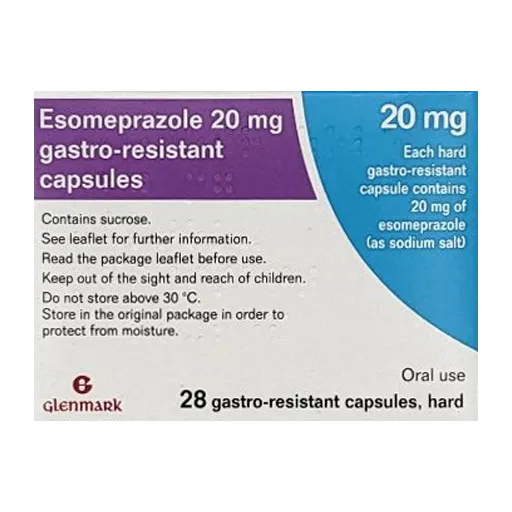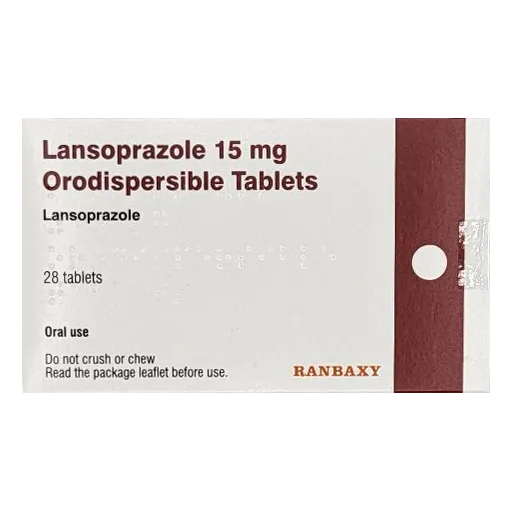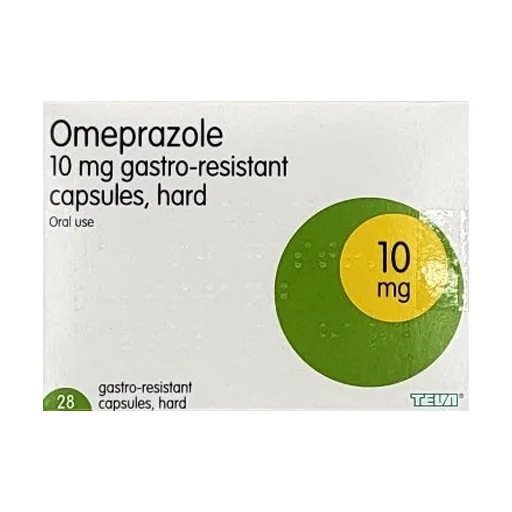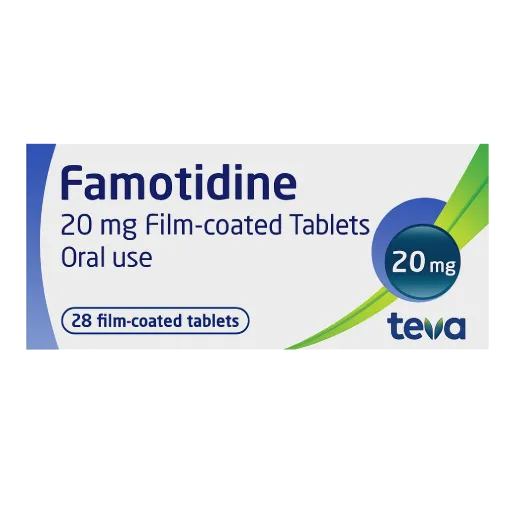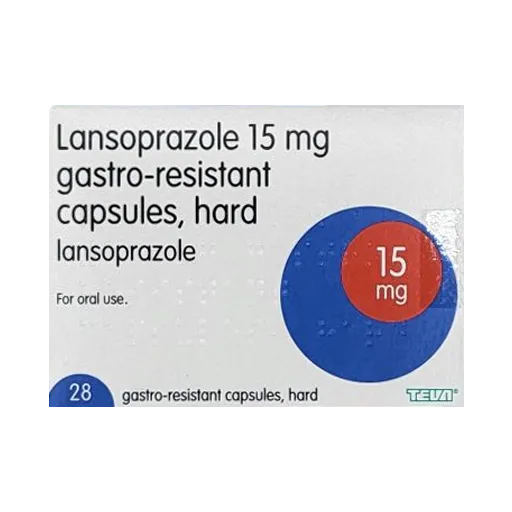
-
Reduces stomach acid
-
Once-daily dose
-
Next day delivery available
-
Genuine medication
-
Discreet packaging
Lansoprazole Capsules 15mg
What it is
Lansoprazole capsules are a prescription medicine used to treat indigestion, heartburn, acid reflux, gastro-oesophageal reflux disease (GORD), gastroesophageal reflux disease (GERD), stomach and duodenal ulcers, Zollinger-Ellison syndrome, and to help clear H. pylori with antibiotics. Lansoprazole is a proton pump inhibitor (PPI). Each delayed release capsule is designed to pass through the stomach and dissolve in the intestine.
How it works
Acid is made by tiny “pumps” in the lining of your stomach. Lansoprazole switches these pumps off, decreasing the amount of acid your stomach produces. Less acid can help your food pipe and stomach heal and can reduce painful symptoms. Many people notice improvement within a few days, but it may take up to 2-4 weeks for full effect.
Buy Lansoprazole Capsules online
You can use our online prescription service to buy Lansoprazole Capsules online in the UK. We are a regulated
GPhC registered pharmacy based in the UK with free and next day delivery. Any website that claims to sell
Lansoprazole Capsules without a prescription is operating illegally and you could be purchasing counterfeit /
fake medicine.
Upon completion of your order, our independent prescriber will then review your online
assessment. If your assessment is approved, our pharmacy team will then receive a prescription and dispense your
order, which will be dispatched the same day using your chosen delivery method.
How to use
Doses (your prescriber will confirm): adults usually take 15 mg once daily for milder symptoms, or 30 mg once daily for short courses or healing ulcers. Some people need 30 mg twice daily for certain conditions (for example Zollinger-Ellison syndrome) — only on medical advice.
When to take: take your capsule at the same time each day, ideally 30 minutes before breakfast. If taking twice daily, take the second dose 30 minutes before your evening meal.
How to take: swallow the capsule whole with water. Do not crush, break or chew — it is a delayed release capsule. If swallowing is difficult, speak to your pharmacist about licensed orally disintegrating tablets.
Missed dose: if you forget a dose, take it when you remember unless it is nearly time for your next dose. If it is time for your next dose, skip the missed dose and continue as normal. Do not take two doses at once to make up for a missed dose. If you are unsure, talk to your doctor or pharmacist.
Keep using lansoprazole for as long as your clinician advises. Once symptoms settle, your dose may be stepped down to the lowest dose that keeps you well.
Who it's for
Adults (and some children on specialist advice) who have conditions caused or worsened by excess stomach acid. It may be used short term to relieve symptoms or longer term when medically needed. Do not use this medicine to self-diagnose persistent tummy or swallowing problems seek medical advice.
Warnings & precautions
Do not take if you are allergic to lansoprazole or any capsule ingredients. Seek urgent help if you develop signs of an allergic reaction such as rash, swelling of the face or throat, wheeze, or sudden dizziness.
Speak to your doctor before use if you have liver problems, unexplained weight loss, difficulty swallowing, long-lasting stomach pain, frequent vomiting, blood in vomit or stools, persistent diarrhoea, or if you are over 55 with new or changed indigestion. Long-term or high-dose PPI treatment may be linked with low magnesium (hypomagnesaemia), low vitamin B12, gut infections (e.g. C. difficile), and increased fracture risk; your clinician may review treatment regularly and check blood tests if needed.
Common interactions
Lansoprazole can change how other medicines work by reducing stomach acid or affecting absorption. Important examples include:
- Some HIV medicines (e.g. atazanavir, nelfinavir)
- Certain antifungals (e.g. ketoconazole, itraconazole)
- Blood thinners (e.g. warfarin - monitoring may be needed)
Leave a gap between lansoprazole and medicines that need acid to be absorbed (for example some antifungals or iron salts). Clopidogrel can usually be used with lansoprazole (avoid omeprazole or esomeprazole with clopidogrel). Always tell your doctor or pharmacist about all medicines and supplements you take.
Pregnancy & breastfeeding
If you are pregnant, planning a pregnancy, or breastfeeding, talk to your doctor. Other options may be preferred first in pregnancy. Small amounts may pass into breast milk; the risk to a healthy, full-term infant is considered low. Your clinician will help you weigh benefits and risks.
Possible side effects
Common side effects include headache, tummy pain, nausea or vomiting, diarrhoea or constipation, and wind. These are usually mild and short-lived. See a doctor urgently if you get severe tummy pain, persistent diarrhoea, yellowing of the skin/eyes, severe rash or peeling skin, unusual bruising, muscle cramps, seizures, or extreme tiredness (these can be signs of rare but serious problems such as low magnesium, liver issues or skin reactions).
How to store
Store at room temperature below 25°C in the original packaging to protect from moisture and light. Keep out of sight and reach of children. Do not use after the expiry date on the pack. Return unwanted medicines to your local pharmacy.
What are heartburn, acid reflux and GORD/GERD?
Heartburn is a burning feeling in your chest or throat caused by acid moving up from the stomach. When acid often flows back into the food pipe (oesophagus), this is acid reflux. If symptoms are frequent or ongoing, it is called gastro-oesophageal reflux disease (GORD). You may also see the term GERD (the US spelling). Symptoms can include heartburn, an acid taste, cough, hoarseness, bloating, or feeling sick. They are often worse after large meals, when lying down, or when bending over.
Self-care tips: eat smaller meals; avoid late meals; reduce alcohol; stop smoking; lose weight if needed; raise the head of the bed; and avoid foods that trigger your symptoms (for example very spicy, acidic or fatty foods). If lifestyle changes and short courses of antacids or alginates do not help, speak to a clinician about treatment options.
Lansoprazole vs Omeprazole
Lansoprazole and omeprazole are both proton pump inhibitors (PPIs). They work in a very similar way by reducing stomach acid and helping your food pipe and stomach heal. Most people find they work about as well as each other. The main differences are small and may not matter for most patients. Lansoprazole is often taken as a capsule and also comes as orodispersible tablets. Omeprazole is widely available as capsules and tablets. Both usually start to help within a few days, but full relief can take 2 to 4 weeks. Side effects are similar and usually mild, such as headache or tummy upset. Interactions are slightly different: omeprazole can affect how clopidogrel works, while lansoprazole is generally preferred if you take clopidogrel. Doses are not directly interchangeable, so follow the dose your prescriber gives you. If you have tried one PPI and it has not helped, switching to the other may help. Cost, availability, your other medicines, and your past response often guide the choice.
How long to take Lansoprazole
Your treatment length depends on the condition being treated. For simple reflux or heartburn, many people take lansoprazole for 2 to 4 weeks and then review symptoms. For healing an ulcer, treatment may last 4 to 8 weeks. For H. pylori infection, lansoprazole is taken with two antibiotics for 7 to 14 days. If you take painkillers like NSAIDs and are at higher risk of ulcers, your clinician may advise ongoing lansoprazole while the NSAID is needed. If your symptoms settle, your dose can often be stepped down to the lowest dose that keeps you well. Do not stop suddenly if you have been on a higher dose for a long time, as symptoms can rebound; a gradual step-down is usually better. Always follow the plan agreed with your prescriber and book a review if you need regular treatment for more than a few months. Seek medical advice sooner if you have red flag symptoms such as trouble swallowing, weight loss without trying, ongoing vomiting, tummy pain that does not go away, blood in vomit or stools, or if your symptoms are not improving after 2 to 4 weeks.
Lifestyle and dietary tips while taking Lansoprazole
Lifestyle changes can support how lansoprazole works by reducing triggers that increase acid. Take your dose 30 minutes before food, at the same time each day. Leave a gap between lansoprazole and antacids or alginate products so they do not affect absorption. Eat smaller, more frequent meals and avoid lying down for at least 3 hours after eating. Try to keep to a healthy weight. Raise the head of your bed if night-time symptoms bother you. Cut back on alcohol and caffeine if they make symptoms worse. Limit very spicy, acidic or fatty meals, chocolate, peppermint, and large late-night meals. Stop smoking if you can, as smoking can weaken the valve at the top of the stomach. Wear looser clothing around the waist to reduce pressure on your tummy. If painkillers are needed, ask your pharmacist which options are kinder on the stomach. These steps may help your PPI work better and may mean you can use the lowest effective dose. If symptoms continue despite these measures and regular treatment, talk to your doctor for a review.
Alternatives & related products
Other PPIs and acid-reducing options are available. Your clinician can advise which is best for you:
More information
For full prescribing details, including dosing, side effects, and clinical data, please refer to the Summary of Product Characteristics (SPC).
You can also visit the NHS page on Lansoprazole and the NHS overview of indigestion / acid reflux for advice on symptoms, causes and treatments.
Frequently Asked Questions (FAQ)
-
When should I take my capsule?
Take it once daily, 30 minutes before breakfast. If you take two doses, take the second dose 30 minutes before your evening meal.
-
What if I forget a dose?
If you miss a dose, take it when you remember unless it is close to the time for your next dose. If it is time for your next dose, skip the missed dose. Do not double up.
-
Can I take antacids or alginates with lansoprazole?
Yes. You can use products like alginates (e.g. Gaviscon) for quick relief. Take them at a different time of day, as they may affect how other medicines are absorbed.
-
Are there long-term risks with PPIs?
Most people use PPIs safely. With long-term use, rare risks include low magnesium, vitamin B12 deficiency, gut infections, and fractures. Your clinician will review your dose and duration.
-
Can I drink alcohol while taking it?
Alcohol does not interact with lansoprazole, but it can worsen reflux. Limiting alcohol may improve symptoms.
-
Is there a version that dissolves on the tongue?
Yes. Orally disintegrating tablets (also called orodispersible tablets) are available.
